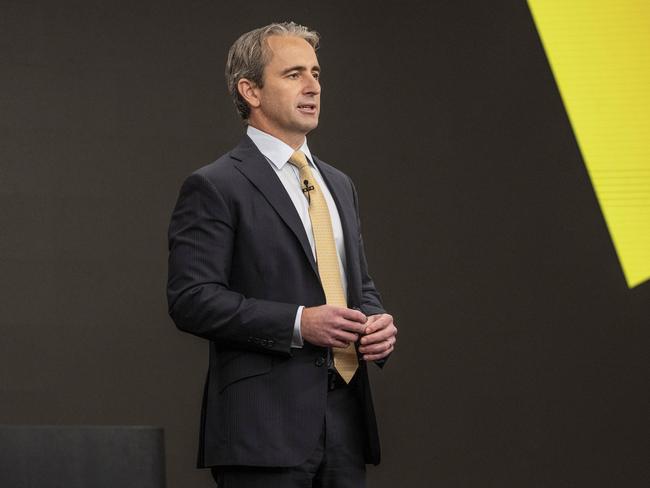CommBank staff threaten to quit over work-from-home crackdown
Hundreds of CommBank employees have written to complain about being ordered back into the office, with some threatening to quit.

Banking
Don't miss out on the headlines from Banking. Followed categories will be added to My News.
Hundreds of CommBank employees have written to the union to complain about the working from home crackdown, with some threatening to quit their jobs.
The nation’s largest bank sparked an internal revolt last month after ordering its 49,000 employees back into the office for at least 50 per cent of the time from July 17.
After CommBank chief executive Matt Comyn and group executive of human resources Sian Lewis delivered the mandate, some employees lashed out at management during an internal town hall meeting held to discuss the changes.
The Finance Sector Union (FSU) says Ms Lewis “angered” many members with the edict, adding the direction was issued “without consultation with CBA staff or the union”.
The union and a delegation of members from CommBank “sought to meet with the HR boss last week to have the edict overturned but Sian Lewis failed to show up”, the FSU said in a statement on Wednesday.
Ms Lewis “left it to HR staff to explain to upset CBA workers why the bank was placing limits on its Work From Home policy”, the statement said.
“It is totally unacceptable that CBA delivers an edict to its staff altering work from home arrangements without any consultation,” said FSU National Secretary Julia Angrisano.
“Hundreds of our members at CBA have contacted the union complaining the bank was overturning working arrangements that have worked well for the bank and its staff.”

Ms Angrisano said FSU members had “raised serious concerns about the significant impact this change would have on them, including on their work-life balance, mental health and wellbeing and caring responsibilities”.
“They complain about the financial impact of increased commuting costs and childcare costs,” she said. “Some say they will now be seeking employment elsewhere.”
She added that for some staff, “their teams are not local so they are being made to go to an office to engage in video meetings with other workers interstate or overseas, or working from home that day”.
“The pandemic showed how well working from home can be achieved and the FSU believes that a new benchmark on remote work has now been set,” Ms Angrisano said.
“We want the CBA to suspend the mandate and engage in proper consultation to jointly develop a working from home policy which should then be enshrined in the CBA Enterprise Agreement.”
A CommBank spokesman said on Thursday that after being contacted by the union, “we responded promptly … arranged the meeting and hosted it with our two most senior executives responsible for industrial relations and key decision makers”.
“It was attended by the FSU’s national campaign manager and three CBA FSU workplace representatives and it was a cordial and constructive discussion,” he said.
“In recognising how important flexibility is to our people, we have been consistently seeking and listening to their views over the past three years. Over that time, we’ve sought feedback through nine group-wide surveys and the responses from tens of thousands of our people on wellbeing, hybrid working and how people preferred to work. Three of these surveys have been in the period since our formal return to the office in March last year.”
He added, “We’ve also provided two months’ notice of our current expectations to help support our people with the time to make adjustments to their current working patterns and raise any questions and concerns they may have. Where someone needs specific support, they can discuss individual flexible working arrangements with their leader that suits both their needs and those of our customers.”
After the initial order, an internal technology town hall was described as a “bloodbath” by business gossip website The Aussie Corporate, which shared screenshots of some of the anonymous comments posted in the online meeting.
One said their team agreed “one office day per week is a good balance”, and demanded to know if leaders “will sign their name on forcing teams back to the office”.
Another raised concerns about the offices having the space to fit all of the returning staff at the same time, with many teams split around Australia and the world.
A third asked if there has been “consideration … to embrace more modern ways of working”, given the ripple effects on working families of forcing parents back to the office amid a cost-of-living crisis.

Speaking to The Australian Financial Review last month, Ms Lewis said the bank had “now set the expectation with our office-based people that from mid-July, they will be required to come into the office for at least 50 per cent of their work time per month”.
She said the move was prompted by a decision to drive innovation and collaboration with face-to-face interactions.
“We’ve learnt that on average, we actively connect with 11 more colleagues each day when we are together in the office and spend 20-30 minutes more time collaborating,” she said.
“Our people also spend 40 per cent or more time connecting with their leader and peers when in the office. We have seen that innovation is an outcome of our people physically working together.”
After the initial backlash, the bank was forced to follow up on the directive in another email the next day.
“We understand how positively everyone has embraced hybrid working and you will still be able to work from home,” the leadership team said.
“However, as we’ve said before, being together in our corporate offices provides stronger levels of connection, which help us in our own learning, as well as in collaborating to build services for our customers and in sharing and co-developing with our colleagues.”
CommBank is just the latest large company attempting to crack down on working from home, which became commonplace during the pandemic and has quickly become one of the most important things to employees.

Research from LinkedIn late last year found nearly three quarters of Australian business leaders prefer staff to work from the office.
In April, NAB chief executive Ross McEwan said he expected senior leaders to return to the bank’s Melbourne headquarters five days a week to set an example for staff, or be prepared to leave the business.
According to The Australian, NAB staff currently spend 1.2 days a week on average in the office, below the bank’s minimum requirement of two to three days.
“Ross has long advocated for the need for teams to be together regularly to collaborate and problem solve for customers,” a spokeswoman told the newspaper.
“NAB is a relationship bank and those relationships are best delivered face-to-face. Ross believes the most senior leaders need to role model the behaviours and culture expected of everyone at NAB.”
After the CommBank furore, Westpac chief executive Peter King emailed staff to note the bank’s hybrid approach “hasn’t changed”.
“We continue to run a hybrid working model, where you’re expected to come into the office two or three days a week,” he said. “Your team days in the office are an opportunity to work together and collaborate in person.”
ANZ similarly has set a target of 50 per cent office time.
Originally published as CommBank staff threaten to quit over work-from-home crackdown





